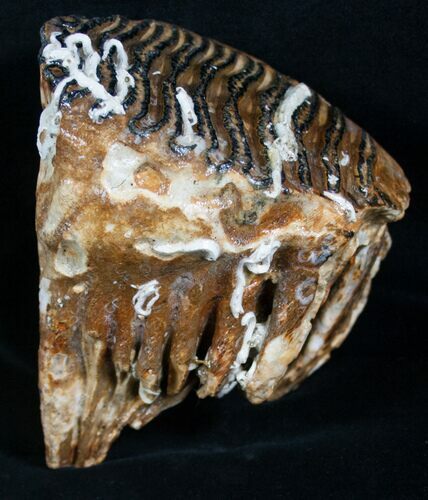This Specimen has been sold.
Juvenile Woolly Mammoth Molar With Roots
This is a molar of a juvenile Woolly Mammoth with a partial root preserved. It comes from the North Sea deposits and would be between 20 and 50 thousand years old. It's in wonderful shape for being submerged for that period of time.
These pleistocene fossils are dredged up by fishing trawlers in the the North Sea between Britain and Denmark. Fishermen routinely find mammoth teeth and many ice aged fossils in their nets and given the chance that a fossil is accidentally gathered in a net is slim the sea floor is probably littered with the remains of millions of animals. The cold temperatures and low oxygen environment of the North Sea has aided in the preservation of these teeth and bones.
While these fossils have been pulled up in nets for more than a century, they were frequently discarded. It wasn't until the past two decades that this material has begun to be systematically collected and studied. By recording the locations of their finds and allowing scientists to make observations before the more common material is made available, much has been learned about the fauna that once roamed the land that now lies 30 to 150 feet below the North Sea waters.
You can read more information about this at the following link.
http://www.independent.co.uk/news/science/the-watery-grave-of-europes-monsters-1744973.html
These pleistocene fossils are dredged up by fishing trawlers in the the North Sea between Britain and Denmark. Fishermen routinely find mammoth teeth and many ice aged fossils in their nets and given the chance that a fossil is accidentally gathered in a net is slim the sea floor is probably littered with the remains of millions of animals. The cold temperatures and low oxygen environment of the North Sea has aided in the preservation of these teeth and bones.
While these fossils have been pulled up in nets for more than a century, they were frequently discarded. It wasn't until the past two decades that this material has begun to be systematically collected and studied. By recording the locations of their finds and allowing scientists to make observations before the more common material is made available, much has been learned about the fauna that once roamed the land that now lies 30 to 150 feet below the North Sea waters.
You can read more information about this at the following link.
http://www.independent.co.uk/news/science/the-watery-grave-of-europes-monsters-1744973.html
SPECIES
Mammuthus primigenius
LOCATION
North Sea
FORMATION
North Sea Deposits
SIZE
4" long, 4.58" Tall
CATEGORY
SUB CATEGORY
ITEM
#8483
We guarantee the authenticity of all of our specimens.
 Reviews
Reviews















